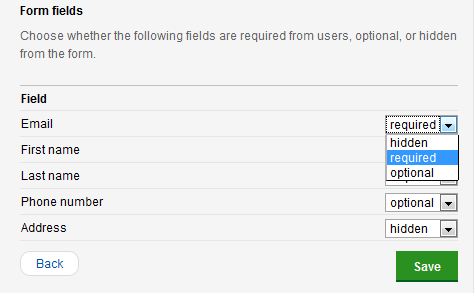- Created by admin, last modified by AdrianC on May 20, 2016
https://help.myob.com/wiki/x/GoSi
ANSWER ID:237, 377
Many businesses send regular newsletters to their customers, either by email or post. Usually, these newsletters will contain information on the following topics:
- general news about your business (such as store openings, seasonal opening hours, etc.)
- new products and services
- sales and promotional offers
- upcoming special events and competitions
If you intend to send newsletters to your customers, the Keep me updated feature provides an easy way for you to gather the contact details of interested visitors. First, you need to add a subscription form to your website, and choose what contact details you want to collect. When visitors choose to sign up, the details they enter in the form will be collected in a CSV file. Then, you can use the contact details in this file to send newsletters to your customers by email or post.
First, you need to add a subscription form to your website, and choose what details you want to collect from visitors.
- Click the Add a subscription form link in the Keep me updated section.

- Complete the fields on the Keep me updated page to personalise your subscription form.

- Choose what details you want to collect from visitors in the Form fields section. For example, if you intend to email your newsletters, you may want to collect their first name, last name and email address.
You can choose whether the form fields listed are required (visitors have to complete the field), optional (visitors can choose whether to complete the field) or hidden (the field doesn't appear on the form).
Once you're finished, click Save.
To edit your subscription form, click the Edit settings link at the bottom of the Keep me updated section.

Once you've added a subscription form to your website and have allowed time for visitors to begin signing up, you can use the contact details collected to send newsletters to your customers.
First, you need to download a CSV file of the contact details you've collected. To do this, click the Download CSV link at the bottom of the Keep me updated section, and save the file on your computer.
Then, if you want to:
- email newsletters to your customers, you can import the CSV file into your email client (such as Microsoft Outlook).
- post newsletters to your customers, you can open the CSV file in Microsoft Excel to view or print the contact details.

Legal obligations
| If you're in... | be aware... |
|---|---|
| Australia | Under the Spam Act 2003, when you send electronic messages (emails), you must satisfy the following three conditions:
For more information, see Understanding Spam and Spam Act 2003: A practical guide for business. |
| New Zealand | Under the Unsolicited Electronic Messages Act 2007, when you send electronic messages (emails), you must satisfy the following three conditions:
For more information, see the Department of Internal Affairs' Anti-Spam webpage. |
FAQs
Yes, you can set the Content visibility settings for this feature so that the Keep me updated section and your subscription form are hidden from your website. For more information, see Setting visibility options for your website content.
Yes. You can track the web traffic to your subscription form by integrating your Google Analytics or your Google AdWords account (or both) with your website. By integrating your:
Google Analytics account, you can track visitors and get a overview of how they're interacting with your website. This means you'll be able to see how many visitors have accessed your subscription form. For more information, see Integrating your Google Analytics account.
Google Analytics won't be able to show you the details your visitors enter in the subscription form. To see these details, you'll need to download and view the CSV file. For more information, see Sending newsletters to your customers above.
- Google AdWords account, you can advertise your business on Google, and use Conversion Tracking to track visitors who click on your ads and complete specific actions on your website. This means you can track visitors who click on your ad, then submit the Keep me updated form. For more information, see Integrating your Google AdWords account.
If a customer wants to unsubscribe, you'll need to handle the process outside of MYOB Atlas. For example, you may need to remove the customer's details from your email address book or any newsletter mailing lists you've created, and let the client know that you've done so. You'll also need to make sure that next time you download the CSV file of contact details from your website, you don't inadvertently resubscribe the customer.
Remember your legal obligations:
| If you're in... | then... |
|---|---|
| Australia | under the Spam Act 2003, you must:
For more information, see Understanding Spam and Spam Act 2003: A practical guide for business. |
| New Zealand | under the Unsolicited Electronic Messages Act 2007, you must satisfy the following condition:
For more information, see the Department of Internal Affairs' Anti-Spam webpage. |
